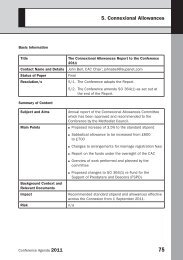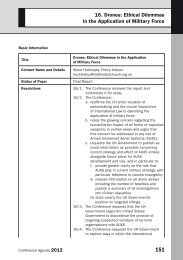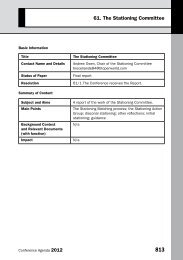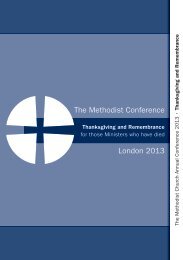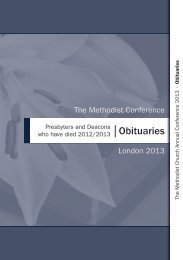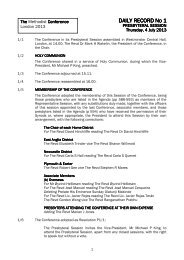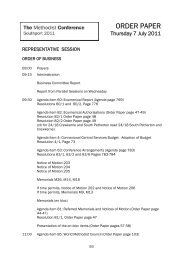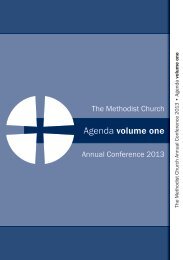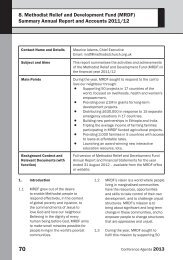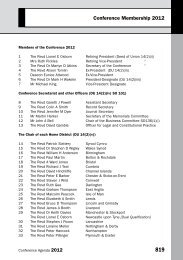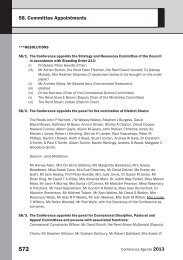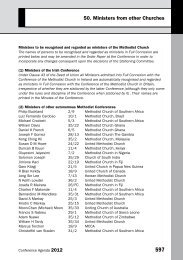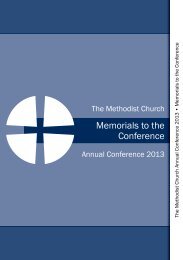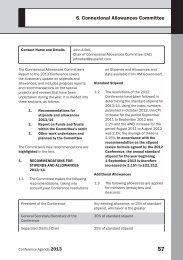Agenda Volume 3 - Methodist Conference
Agenda Volume 3 - Methodist Conference
Agenda Volume 3 - Methodist Conference
Create successful ePaper yourself
Turn your PDF publications into a flip-book with our unique Google optimized e-Paper software.
57. The Fruitful Field Project<br />
l<br />
lay and ordained <strong>Methodist</strong>s<br />
who share in the ministry of God<br />
within the life of the <strong>Methodist</strong><br />
Church to be effective leaders,<br />
servants and partners in God’s<br />
mission<br />
church and community<br />
development: challenging and<br />
equipping Circuits and Local<br />
Churches as they change<br />
and grow as mission-focused<br />
Christian communities of faith,<br />
hope and love.<br />
158 As with the Network as a whole, the<br />
team will:<br />
l<br />
l<br />
l<br />
focus on serving and supporting<br />
Circuits, Local Churches and<br />
Districts, working with all those<br />
who lead and serve Circuits,<br />
Local Churches and Districts<br />
work through interactive<br />
relationships and in dialogue<br />
with local communities –<br />
their diverse and continually<br />
developing contexts, needs and<br />
aspirations<br />
provide a coherent,<br />
comprehensive and excellent<br />
service through embodying a<br />
breadth of knowledge and skills,<br />
through working to enhance the<br />
quality of its work, and through<br />
being well-coordinated.<br />
159 The establishment of one staff<br />
team was prefigured both in the<br />
consultation document and in the<br />
Committee’s interim response. The<br />
Committee was particularly pleased<br />
to note the warm reception given<br />
to the concept by those already<br />
working for the Church within<br />
institutions and existing expert staff<br />
posts. A submission made by a<br />
tutor during the consultation period<br />
noted that “the vision of a single<br />
connexional network of skilled and<br />
knowledgeable staff is exciting and<br />
energising, enabling the sharing<br />
of skills, resources, expertise and<br />
stimulating creativity and debate.<br />
There is the potential for more<br />
engagement with the diversity of the<br />
Church; for avoiding duplication of<br />
work; for enabling creative thinking<br />
through releasing resources and<br />
linking different people; and for using<br />
and encouraging a greater variety of<br />
people’s skills, gifts and expertise.”<br />
A regional forum’s submission<br />
similarly noted that “integration of all<br />
the people involved in training and<br />
development would be desirable and<br />
strengthen the Church.” A learning<br />
institution’s submission noted<br />
that “the concept of a connexional<br />
network is welcomed... [It] can be<br />
a means of bringing together the<br />
wide range of professional expertise,<br />
knowledge and theological awareness<br />
from a range of bodies and<br />
institutions from across the regions<br />
that will enable cross-fertilisation in a<br />
way which has always been intended,<br />
but not always implemented.” Another<br />
institution noted that “we support the<br />
vision of a single network of skilled<br />
and knowledgeable staff. We see<br />
the current disconnection between<br />
regional/ District officers and learning<br />
institutions as profoundly unhelpful.<br />
The experience of forming ‘networks’<br />
<strong>Conference</strong> <strong>Agenda</strong> 2012 707



